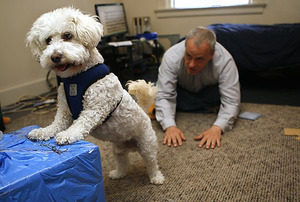Bevan Dufty, director of San Opportunity Partnerships and Engagement (HOPE), has developed the latest program that he hopes will encourage panhandlers to get off of Bay City streets and eliminate one of the biggest turn-offs to tourists visiting the city.

“I’m tired of pushing people around,” Dufty tells the San Francisco Chronicle. “You can make it difficult for people to panhandle, but ultimately they’re just going to go do it somewhere else.
In exchange for a panhandler’s promise to stop begging for money on the streets, Dufty would like to offer him or her a $50 to $75 weekly stipend for fostering a homeless puppy. He is hoping that the program will offer those in need the chance to learn skills that will transfer to the workplace.
Dufty plans to initiate the program, called Wonderful Opportunities for Occupants in Fidos, or WOOF, on August 1 of this year.
Rebecca Katz, the director of San Francisco Animal Care and Control, believes that WOOF could be the answer to the shelter’s overpopulation problems. According to statistics, the facility took in 2,424 dogs last year in the midst of the economic downturn. Compare that to the year 2008, when they took in just 1,939 dogs, and the need for a viable solution is evident.
“We find ourselves euthanizing dogs that in the past might have gone to rescue,” Katz tells the Los Angeles Times. “We give them a lot more time than any other shelter I know if in the state or the county. Still, there comes a limit.”
Katz is working with Dufty to coordinate the WOOF program in a way that meets the needs of the city’s panhandlers and homeless pets.
San Francisco Animal Care and Control will be in charge of the application and screening process to ensure that the potential foster does not have a history of severe mental illness, substance abuse, or a violent criminal past. The foster parent also must be living in a supportive housing unit – not out on the streets – in order to provide shelter for the homeless animal.
All of the supplies needed to care for the puppy, including veterinary care, food, toys, training sessions, and check-ups will be provided by San Francisco Animal Care and Control as well.
Dufty promises that the program will include supervision. Foster parents would be subject to house checks to ensure that the animal under their care is being provided for and that the environment continues to be suitable. If the individual is caught panhandling, with or without the puppy present, the animal will be returned to the shelter immediately.
WOOF is currently being funded by a $10,000 philanthropic grant from famed San Francisco socialite Vanessa Getty. Dufty is hoping to receive more donations in the coming months. He believes that WOOF could be the answer San Franciscans and city visitors have been looking for and the opportunity panhandlers need to change their lives.
“Why not try to meet their needs for income in a way that helps the city and its animals?” Dufty says.









